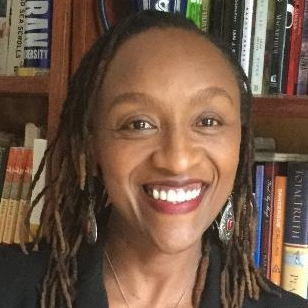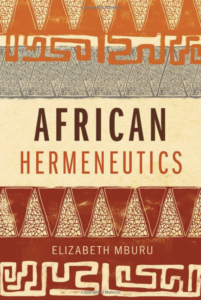About African Hermeneutics
A Conversation with Elizabeth Mburu
Every Voice: What led you to write this book? What problem or issue(s) are you seeking to address?
Elizabeth Mburu: There are several factors that motivated me to write African Hermeneutics. The first was the lack of contextual resources available to my students. I realized that as my students learned how to interpret the Bible, they seemed unable to grasp the link between the world of the text and their own world. Both interpretation and application were often flawed. I realized that the courses in hermeneutics my students were taking didn’t seem to be affecting how they interpreted text. This was also reflected in their preaching. It was not uncommon for sermons to be completely disconnected from the realities of the text. A second driving force was the rapid growth of the church in the global south and particularly in Africa. By 2018, Africa had the largest number of Christians in the world. In fact, a recent Pew research predicts that 4/10 Christians will live in Africa by 2060. However, there is a troubling dichotomy in the church alongside the growth. This dichotomy manifests itself in several ways. The most serious is Neopentecostalism and its attendant doctrines with the major doctrine being the prosperity health and wealth gospel. There is a proliferation of false “prophets” and of “mighty men and women of God” offering healings, miracles, and wealth. Syncretism is also a major challenge. Traditional practices such as witchcraft, ancestor worship/veneration, and polygamy are actually on the increase with a growing group of Christians in Africa now rejecting Christianity altogether. Other evidences of this dichotomy include corruption and unethical practices, wars and displacement, schisms (based on power struggles rather than doctrinal controversies), and the growth rather than the decrease of ethnic hostility
I felt that we were missing something in our interpretation of the Bible. Given that Christianity has been on the continent for more than a century (i.e. the modern missionary movement), these issues should not be there. I concluded that foreign methods were the problem as they introduced a double hermeneutical gap which made the text seem even more remote from our African context.
EV: What is the thesis of your book?
EM: Since there is no neutral interpretation of a text, our worldviews will always influence our understanding of Scripture, either positively or negatively. In other words, all hermeneutics is contextual. As African readers of the biblical text, we must discover our cultures and worldviews and apply them in our hermeneutics. However, as we do so, we must be careful to interrogate our assumptions so as not to displace biblical revelation. Our conclusions must be in alignment with the biblical metanarrative.
EV: Who’s your target audience, and what are you most hoping they hear from it?
EM: My target audience is the African undergraduate student studying theology. I am hoping that they understand how important it is to recognize that we all interpret from a cultural context and that it is important to interrogate that context in the process of interpretation. However, I also believe that people in other contexts can benefit from this book. If we truly believe that the church is one body, then we ought to be aware of what is happening in the rest of the world. After all, our scholarship ought to serve the Church and society. This is the concept of unity in diversity and the recognition of the multidimensional/global character of the Christian faith that is vividly illustrated in Rev 7. This approach challenges and broadens the lens of assumptions and interpretation of those outside Africa because it presents readers with a different way of looking at texts. It can help other readers see what lies in their blind spots.
EV: Did you have any “aha” moments while writing the book?
EM: Yes, I did, particularly when I was working on the chapter on parallels to the African context, which is the first leg of my approach, the four-legged stool. It suddenly dawned on me that in contrast to the methods I was used to, it is really the reader’s context that is the logical starting point. This is because it guides readers from the known to the unknown. This first leg primarily involves identifying parallels between our theological and cultural contexts and the biblical text. It is a bridge between the two contexts that allows us to do two things. One, it enables the listener to begin to understand the biblical text from a familiar position. Two, it allows us to examine ourselves so that we can correct any faulty assumptions that may hinder the interpretive process. An accurate reading of the text demands that as the listener steps into the text, the text is also being urged to confront the perspective of the listener—an inter-dynamic process that ensures that no faulty assumptions interfere with interpretation. This leg therefore guides us in identifying both points of contact as well as differences with the biblical context. Only when we encourage dialogue between the African and the biblical worldviews, can we determine what is negotiable and what is non-negotiable. This will help us develop a truly biblical worldview while at the same time retain what is uniquely African. I believe this is one way we can avoid the current post-Christian crisis being experienced in the Global North.
EV: What was the most challenging part of the book to write?
EM: The most challenging part and the one that I feel doesn’t work quite as well, is the one on the genre of letters. This is because the letter form only came into Africa after the modern missionary movement and colonization. Naturally, Africans had a way of communicating information but we don’t have the genre of oral letters.
EV: What kind of seminary/church classes should assign your book?
EM: Since hermeneutics is foundational for all studies associated with the Bible, I think it should be assigned for anyone in Bible college or seminary.
EV: Why are resources such as African Hermeneutics important for the church in Africa?
EM: There are several reasons:
- The biblical text finds a home in the African heart because it speaks to the contextual realities that believers face daily. It is no longer an object that has been imposed on us by the West, but rather a relevant text that allows us to engage in constructive dialogue and confronts us where it matters. Because it pays attention to the African context, application is more relevant.
- It confronts dichotomy and syncretism by allowing for dialogue between the biblical and African cultures and worldviews, thus exposing wrong doctrine and practice.
- It acknowledges the multidimensional/global character of Christian faith. This is because it allows for fresh insights from the biblical texts. It provides a different way of reading that complements Western and other readings.
- It includes ordinary readers. Rather than relegating hermeneutics to the domain of academics/intellectuals, it makes it possible for ordinary readers to participate actively in Bible interpretation.
- It encourages transformation of society. Because it promotes understanding and internalization of biblical truths within the African context, the potential for transformation of society is increased.
- It promotes understanding and interrogation of African contexts and awareness of our religious spaces. This is very important because Africa is very pluralistic and religious spaces are quite porous, which is why syncretism is so prevalent.
- And perhaps most importantly, it helps redefine Christian African identity. Identity is core to our human existence. We operate on the basis of our identities. In Africa, culture (including religious culture) and ethnic identity may even overshadow Christian identity. Our identity markers should not be decided for us by African traditional religion, culture, or even our African worldview. This approach allows for a redefinition of identity based on biblical criteria.
About the Author

Elizabeth Mburu (PhD, Southeastern Baptist Theological Seminary) is Regional Coordinator of Langham Literature in Africa and Associate Professor of New Testament and Greek, Pan-Africa Christian University.

